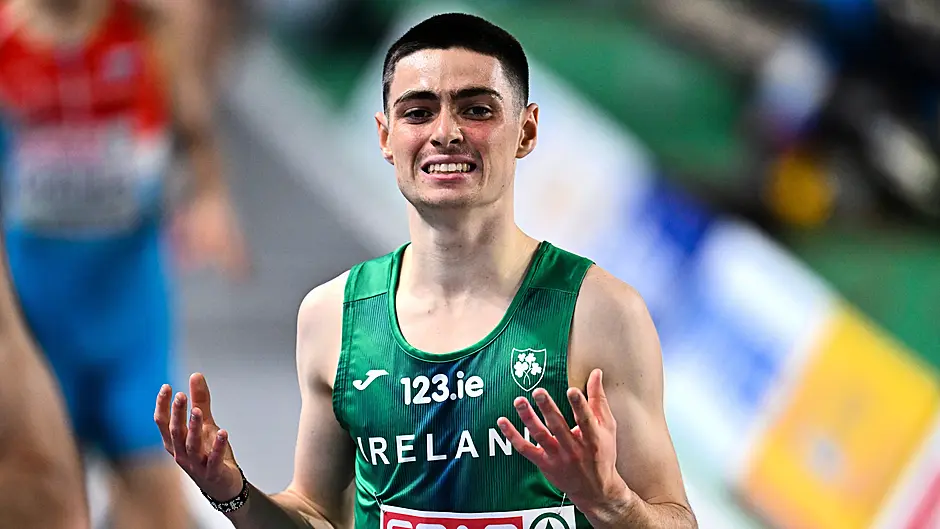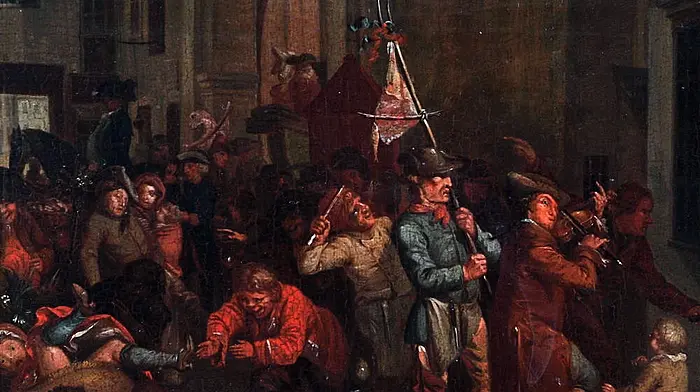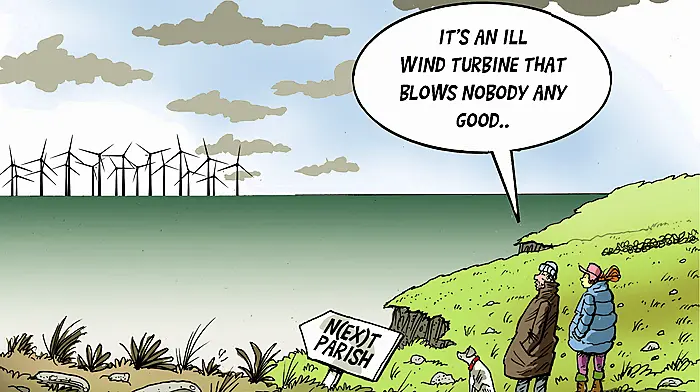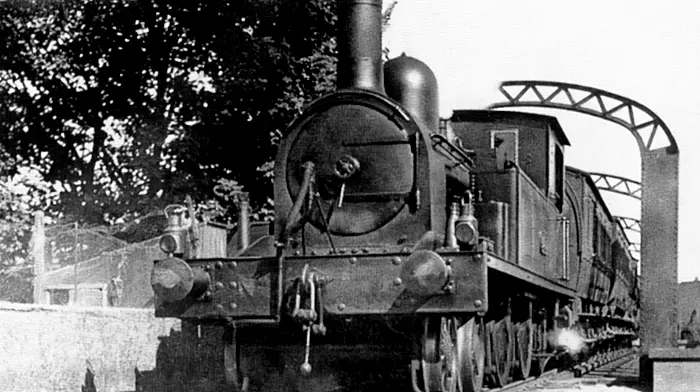After missing out on the World Athletics Championships Darragh McElhinney chats to KIERAN McCARTHY about how his summer horribilis unfolded
****
DARRAGH McElhinney experienced the I-wish-I-was-there pang while watching the men’s 5000m final at the World Athletics Championships last month.
He spent six weeks this summer touring Europe, chasing the qualification times needed to join the party in Budapest, but he came up short.
It left the Glengarriff man on the outside looking in as the world’s best lined up at the start for the 5000m final. That Sunday night McElhinney watched on from Shane Lowry’s The Old Warehouse restaurant in Tullamore. It didn’t surprise him that Jakob Ingebrigsten won, again. He knew Mohamed Katir would be in the mix, and the Spanish athlete finished second. He did expect more from French athlete Jimmy Gressier, who was in the hunt at the bell but finished ninth. That’s the company McElhinney wanted to be in, but the 22-year-old learned this summer that the journey in sport is not linear; there will be bumps in the road. (Important context: he has a high ceiling, but McElhinney is young and still inexperienced at the highest level.)
Primed to strike after his brilliant fourth place in the men’s 3000m final at the European Indoors in March – a race won by Ingebrigsten – the West Cork man’s outdoor season never took off.
‘There have definitely been a few things that haven’t worked out the way I would have liked,’ he admits.
‘After the indoor season it was about qualification for the Worlds. There were two ways of achieving that – you either run the 5000m automatic time which was 13:07 or else you use three good performances to get enough ranking points. You can use one indoor time, so going into the summer I had got quite a lot of points from coming fourth in Istanbul, plus the time (7:44.72 in the 3000m) was solid too.’
It left McElhinney chasing two good 5000m times – and he felt this was within his reach.
But he also knew he was under a bit of pressure to run those fast times, admitting he didn’t take advantage of the shape he was in after the 2022 European Athletics Championships in Munich last summer.
‘The qualification window opened on July 31st, 2022 so in hindsight, considering that I was close to the best shape I had ever been in after the Europeans last summer, I should have gone into a quick 5k race after that and I would have been able to carry that time into this year. Then I would have needed only one race this summer,’ he explains.
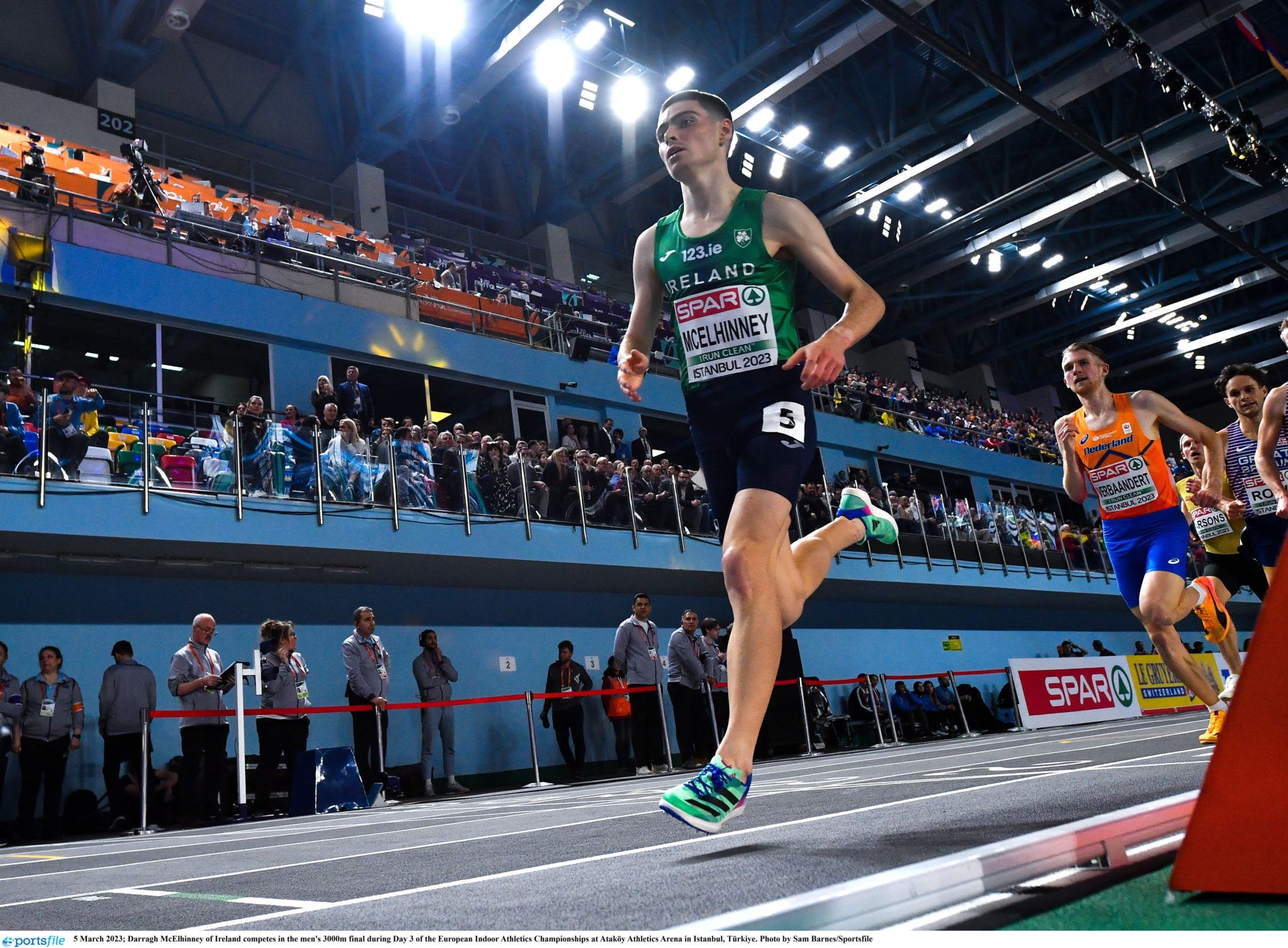 Darragh McElhinney in action at the 2023 European Indoor Athletics Championships.
Darragh McElhinney in action at the 2023 European Indoor Athletics Championships.
McElhinney needed everything to go right this summer to run two fast 5ks before the qualification window shut on July 30th. He started well, 3:38.17 in a 1500m in Karlsruhe on May 20th, just outside his PB of 3:37.72 set in June 2022. Seven days later the plan was to compete in the 5000m in Oordegem, Belgium, where he ran his PB (13:17.17) 12 months earlier.
‘Everything was trending in the right direction then, but I came down with a dirty flu, a sinus infection or something, and I had to pull out of the race,’ he explains.
‘At the time I didn’t panic because I thought there would be other opportunities to run well, but the reality was that race was where a lot of guys of a similar standard to me were in action.’
McElhinney now had six weeks to run those two fast 5k times. The clock was ticking. It didn’t help that his sickness left him drained. He had missed a lot of training.
‘I went to two races in Scandinavia – one in Copenhagen, the other in Gothenburg – but the bottom line is I wasn’t in brilliant shape, the sickness took a lot out of me,’ he says.
‘I knew going in I wasn’t at my best fitness but thought I’d get away with it, and run close to 13:20, get qualification points and it will be fine. The reality is I was way off my best and ended up running really slow. I ran crap both times.’
He ran 13:37.80 in Copenhagen and, 11 days later, 13:30.71 in Gothenburg. The Worlds were slipping away from him. Chasing these races wasn’t working. He needed to get back training and towards his best shape, so went back up into altitude training.
His summer took another twist when he was cut from a race he had targeted: the 5000m at the Night of Athletics meet in Heusden, The Netherlands on July 15th. That was the race where Brian Fay set a new Irish record of 13.01.40 in a quality field. Instead, McElhinney had to gather himself for the Morton Games in a wet and cold Dublin the night after.
‘I was on the start-list until about eight or nine days beforehand, but I ended up getting cut because a lot of Americans were over from the States to do a European season. Because I hadn't had a good season up until then I ended up being cut, and went to the Morton Games instead – and that didn’t go well. That was really frustrating,’ he says, reflecting on his third place finish and 13:29.77 time.
‘A load of things went wrong, and the bottom line is through sickness and everything else I just wasn’t fit enough at any stage to just go out and get the times I needed.
‘This summer was my least enjoyable as an athlete. You are used to going after these races and knowing if everything goes right, I can do something special, but because of the sickness and then chasing races I never felt brilliant all summer.
‘I struggled with that a little bit too, it was hard to get myself up for the races because I knew I wasn’t in the best shape.’
McElhinney didn’t defend his Irish 5000m men’s title at the national championships on July 30th, the final day of the qualification window. Instead, he went to Luxembourg to chase the qualifying standard in a paced race.
‘Deep down, due to the chaotic nature of the two months before, I knew I wasn’t going to go out there and run 13:06, but it was an opportunity to do it so I had to try. I went out at that pace, felt it really hard after two and a half kilometres and ended up stepping off. There were a lot of bad days this summer,’ he admits.
 Darragh McElhinney celebrates his senior men's 3000m win at the Irish indoor championships in February.
Darragh McElhinney celebrates his senior men's 3000m win at the Irish indoor championships in February.
This summer was a learning experience and he will take those lessons into the next 12 months as he targets a spot at the Olympic Games in Paris. Still based in Dublin, he has finished college now, his degree in history and politics at UCD all wrapped up, and is now a full-time athlete. That brings him greater flexibility in his approach. Take the camp he is going to in Switzerland this month – he booked the flights out, but not the flights home yet because he’s not under pressure to attend lectures.
McElhinney’s approach for the challenge ahead will also change.
‘You might think it’s the noble thing to do but there is no point stepping on the startline unless you are really ready to go, and have those solid blocks of training behind you,’ he points out.
‘Going into next year I know what I need to do in terms of getting in that quality training, getting in those early races and doing six weeks of training before I pick a race to qualify, as opposed to doing this race, training for ten days, then do this race. I definitely over-raced and it took a lot out of me.’
McElhinney took 11 days off in August. It’s a break he needed, for the body and mind. His body was depleted more so than being sore.
‘It was the constant racing and I don’t think I had that base layer of fitness that I usually have,’ he admits.
‘This year, knowing there was the expectation, stress and pressure of trying to qualify, it has been hard for me to manage. I needed a break.
‘The next few weeks will be about getting the legs back under me and preparing for a big season that has an Olympics. I know if I am 100 percent and competitive I can do all the things I need to do to qualify for Paris. I don’t want to end up in a situation like this year when things aren't going right. It’s not easy to combat that. If your body is not co-operating it’s impossible to run to a high level. What I want to make sure is that going into next year I am, mentally and physically, fit and healthy and ready to attack it with everything I have.’
Lessons have been learned from his summer horribilis. McElhinney will bounce back, wiser for the experience. A bump on the road that he hopes will lead to Paris next summer.

